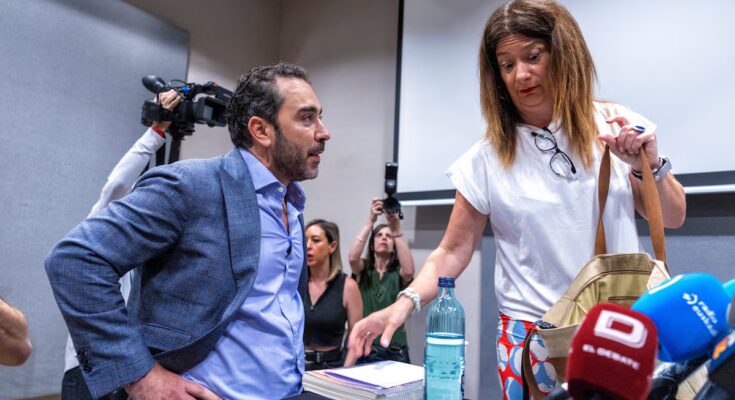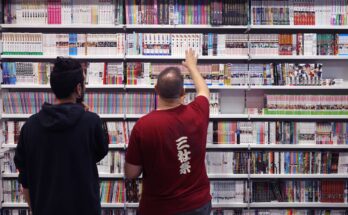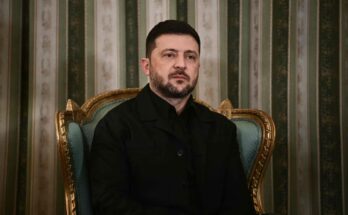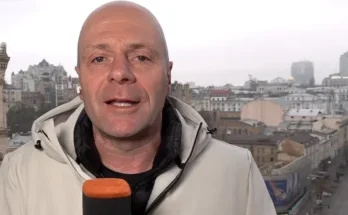The former PSOE militant Leire Díez and the entrepreneur Javier Pérez-Dolset have been doing the rounds of television from top to bottom in recent months answering all the questions of journalists who wanted to understand why they both met with prosecutors, civil guards or defendants in different cases to obtain information from them and offer them improvements in their investigations or promotions in their job aspirations. But this Monday comes the time for the real interrogation.
The two testify as defendants before the head of Madrid’s No. 9 investigative court, Arturo Zamarriego, and face questions, far less friendly than journalistic ones, on up to 10 charges, including the prosecutor’s office believing they both committed crimes of influence peddling and corruption. The Public Prosecutor accuses the former socialist councilor of Vega de Pas (Cantabria), Leire Díez, of having conducted a “criminal plan” to “discredit” the management of the Central Operational Unit (UCO) of the Civil Guard and Anti-Corruption with the aim of “cancelling” investigations that “affect politicians and businessmen”.
Magistrate Zamarriego is already accumulating unfavorable testimonies against him from several witnesses who have testified in the last two weeks: two public prosecutors – the capital prosecutor Ignacio Stampa and the former anti-corruption prosecutor José Grinda -, a commander of the armed institute – Rubén Villalba, currently accused in the The Koldo case– and a dozen journalists who met Díez or who published some kind of information about her.
But the summary already contains one of the most relevant pieces of evidence to piece together the puzzle of the investigation. A recording in which Díez introduces himself as “the right-hand man” of former party organization secretary Santos Cerdán, whom he claims he barely knows.
This is precisely the meaning of this Monday’s appointment: to know what degree of connection this former militant and the entrepreneur Dolset had with those who pulled the strings of the PSOE between 2024 and 2025, when their activity will be covered. Since Leire Díez held a press conference on June 4, renouncing his political activism, and explaining that all his meetings were part of a journalistic work to write a book, his version has changed.
After learning of his meeting with the prosecutor Stampa on May 7, Díez stated that it was impossible that there was an audio in which he could be heard saying that there was nothing concerning Santos Cerdán. But once he became aware of the recording made by Stampa himself, in which he actually presented himself as “the person that the PSOE put together to see what was behind all this” (in relation to the alleged corruption in the police and judicial sphere), he explained that it was “recklessness” on his part and that it was a way of “taking the piss” to gain the trust of his interlocutor, according to sources close to him.
The businessman Pérez-Dolset, also investigated by the National Court for a matter of subsidy fraud, verbalizes in the aforementioned recording that they had a sort of assignment to “clean” what they call the sewers, after a court accused the wife of the President of the Government, Begoña Gómez. “So the president has already said: ‘let everything be clean'”, reflected Pérez-Dolset, in the meeting with the prosecutor Stampa.
The version of Díez and Pérez-Dolset will try to follow the line they have publicly followed, according to sources close to them, to deny before the judge that they are the “plumbers” of the PSOE, as some media define them, to carry out the invisible work of the political party in the underworld. They insisted on the same story: they acted as a journalist, she, and as a victim of the system, he, whose manifest intention was to denounce judicial abuses.
But it will not be an easy task to support this thesis in front of nine lawyers who have meticulously prepared the interrogation and who, unlike the television hosts, intend to put them on the spot to discover all the contradictions. It is expected to be a long one because the case already has so many popular charges that some lawyers joke that an interested footballer could appear there at any moment. On the podium there will be two associations of civil guards, the ultra-Catholic association Hazte Oír, as well as the political parties PP, Vox and Iustitua Europa, and the lawyers of the magistrate Manuel García-Castellón and the entrepreneur and commissioner Víctor de Aldama, who also wanted to exercise the right of accusation because they could see in the published conversations that Díez and Dolset were seeking information on them. The defense of the former Minister of Transport, José Luis Ábalos, and his former advisor, Koldo García, also tried to appear, but for now the judge has not responded to their request.
Following this Monday’s declarations, the matter could also become complicated for Cerdán, who has been in provisional prison since last June for the corruption plot of The Koldo case. After the interrogation of nine journalists last Tuesday, Hazte Oír has already requested their indictment. Judge Zamarriego has yet to decide on this topic, as well as on the complaint filed by Vox which also requested the indictment of one of the former deputy’s lawyers, Jacobo Teijelo, for his participation in the meeting between Díez and Dolset with an investigator for hydrocarbon fraud at the National Court. In the recording of that meeting, the former socialist militant is heard asking for information on a UCO lieutenant colonel and offering the suspect, in exchange, to sit down and negotiate with the Prosecutor’s Office. This video was the one that gave rise to what is now known as the Leire case last July 24th.



